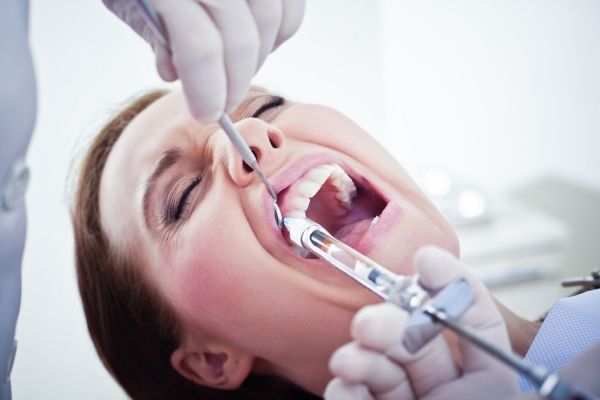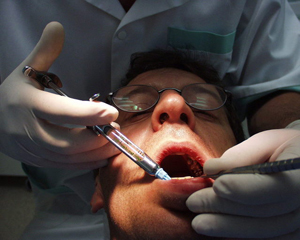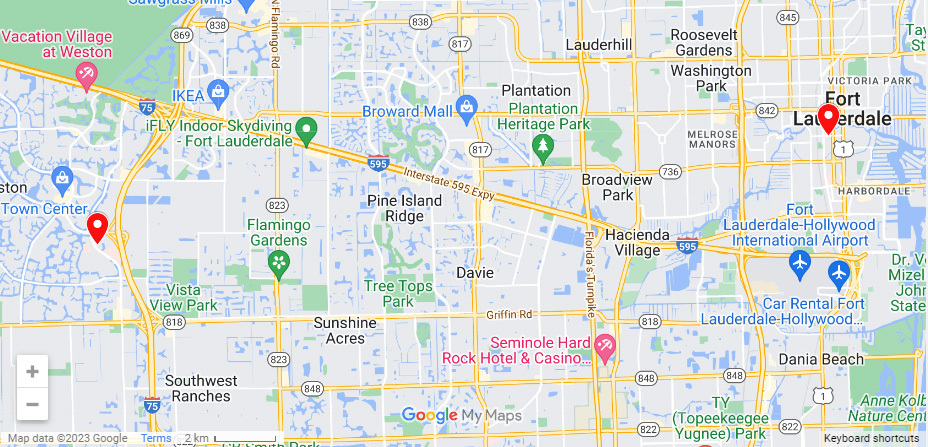When most people think about malpractice, they think about medical doctors and major surgical procedures, rather than mistakes by a dental professional. However, dental malpractice is a serious issue that can have devastating effects on patients. Just like medical doctors, dentists are held to a high standard of care when it comes to treating their patients. When they fail to meet this standard and cause harm as a result, patients have the right to seek legal recourse.
- What Is Dental Malpractice?
- How to Prove Dental Malpractice
- Types of Florida Dental Malpractice Cases
- What Compensation Can I Receive in a Dental Malpractice Lawsuit in Florida?
- Nerve Damage During Dental Work
- Frequently Asked Questions about Dental Malpractice
- Get Help from a Fort Lauderdale Dental Malpractice Attorney
If you’ve experienced dental malpractice in Fort Lauderdale, you know how devastating it can be. What you may not know is how to protect your legal rights and recover the compensation you are owed by the negligent dentist. Fort Lauderdale dental malpractice attorney Lisa Levine can help.
Fort Lauderdale Dental Malpractice Attorney Serving Clients Throughout Broward County and Florida
Lisa Levine is a skilled medical malpractice lawyer who represents the victims of negligence on the part of dental health professionals. If you have suffered injuries due to negligence by a dentist or oral surgeon in Broward County or anywhere in South Florida, Lisa can help you recover for your losses, including the bills to reverse the error, lost work and pain and suffering.
Dental Malpractice Victim
Call Lisa S. Levine P.A. at 954-256-1820 to schedule a free consultation. Lisa Levine represents people all over Broward County, including Fort Lauderdale, Pembroke Pines, Hollywood, Coral Springs, Miramar and Davie. She also represents clients in Miami-Dade County and Palm Beach County.
What Is Dental Malpractice?
Dental malpractice refers to instances where a dental professional fails to provide the expected standard of care, resulting in harm to the patient. Just like medical malpractice, dental malpractice can have serious consequences for the individual affected.
Not all dental procedures go as planned, and not all unfortunate outcomes can be considered dental malpractice. However, when a dentist or oral surgeon deviates from the accepted standard of care and causes harm to a patient, it may be grounds for a lawsuit. it’s important for the patient to speak to a Florida dental malpractice lawyer to determine whether they have a case.
How to Prove Dental Malpractice
To prove dental malpractice, several key elements must be established.
- First, it must be proven that a dentist-patient relationship existed at the time of the incident.
- Second, it must be established that the dentist did not provide care in accordance with accepted standards of care.
- Third, it must be proven that the dentist’s breach of duty caused the patient harm.
- Finally, it must be shown that the patient suffered damages as a direct result of the dentist’s actions or inaction.
If you believe that you may have a dental malpractice case, contact Fort Lauderdale dental malpractice attorney Lisa Levine to discuss your options and determine the best way to move forward. As an attorney with decades of experience helping victims of negligence, Lisa can help gather the necessary evidence, consult with expert witnesses, and present a compelling argument to prove your case. Don’t hesitate to take action and seek justice for your suffering.
Types of Florida Dental Malpractice Cases
There are many types of dental malpractice cases that are common in Florida. These include:
- Misdiagnosis or failure to diagnose oral conditions: If a dentist fails to properly diagnose a dental condition, such as gum disease or oral cancer, and the patient suffers harm as a result, it may be considered dental malpractice.
- Negligent extractions and other surgical procedures: Oral surgeries require precision and expertise. If a dentist or oral surgeon makes a mistake during a procedure, such as damaging nerves or performing unnecessary extractions, leading to complications or injuries, it may be grounds for a dental malpractice claim against the practitioner.
- Root canal errors: A root canal is a procedure that involves removing the infected pulp from inside a tooth and sealing it to prevent further infection. However, if a dentist performs a root canal improperly, it can lead to severe pain, infection, and even tooth loss. Examples of root canal errors include perforating the tooth or failing to completely clean and seal the root canals.
- Negligent placement of dental implants: Dental implants are used to replace missing teeth and provide patients with a natural-looking smile. However, if a dentist improperly places the dental implant or fails to adequately assess the patient’s oral health before the procedure, it can result in infections, nerve damage, or even implant failure.
- Anesthesia errors: Dentists often use anesthesia to ensure patient comfort during dental procedures. However, administering anesthesia requires careful monitoring and dosage control. If a dentist fails to properly administer anesthesia, resulting in complications or injuries to the patient, it may be considered dental malpractice.
- Infection or post-operative complications: After dental procedures, patients rely on dentists to provide proper care and guidance for healing and recovery. If a dentist neglects their duty to prevent infections or fails to address post-operative complications, leading to further harm or prolonged suffering for the patient, it may be grounds for a dental malpractice claim.
If you believe that you or a loved one has suffered from a dental malpractice incident, do not hesitate to reach out for help. An experienced Florida dental malpractice attorney can fight for your rights and help you obtain the compensation that you deserve.
What Compensation Can I Receive in a Dental Malpractice Lawsuit in Florida?
In a dental malpractice lawsuit in Florida, the compensation you can receive may include:
- Economic damages: The damages cover medical expenses, lost wages, and future medical treatments.
- Non-economic damages: These damages cover pain and suffering, emotional distress, and loss of enjoyment of life.
It is important to note that the amount of compensation you can receive will depend on the specifics of your case. Hiring an experienced Florida dental malpractice attorney can help ensure that you receive the maximum amount of compensation possible for your damages. Don’t hesitate to reach out to us if you believe that you or a loved one has suffered from dental malpractice.
Nerve Damage During Dental Work
The mouth is full of sensitive sensory organs. In particular, the lingual nerve and the inferior alveolar nerve are often injured during dental procedures due to their close proximity and the complexity of the oral anatomy. Anytime these nerves are in any way damaged or disturbed, the results can be extremely painful.
Lingual Nerve Injuries
The lingual nerve is extremely important for facial sensation. The nervous system carries signals to and from the brain. The lingual nerve is part of the mandibular nerve, one of three important nerves in the head and face.
The mandibular nerve covers roughly the bottom third of the face, starting at the lower lip, and carries sensation from the chin, jaw and lower portion of the inside of the mouth. It sends the brain signals pertaining to sensation, including pain and temperature. It does not carry taste, so while it will not inform the brain if the food tastes poorly, it will inform the brain if the food is too hot or if there are other problems with it.
The lingual nerve runs from roughly under the tongue to near the brain.
If a dentist or oral surgeon is negligent in certain work, including during wisdom tooth removal or anesthesia, it could result in the lingual nerve being damaged. The victim may suffer continuous pain and altered sensation that, in some cases, can only be remedied by surgery and other complicated and expensive techniques.
Due the lingual nerve’s position in the mouth, it is often subject to damage during dental work, such as:
- Removing wisdom teeth
- Removing molars
- Removing tumors
- Implant placement
- Inferior dental block injections
- Anesthesia
Inferior Alveolar Nerve Injuries
Another common dental nerve injury involves the inferior alveolar nerve, which is responsible for sensation in the lower teeth and gums. Similar to the lingual nerve, damage to the inferior alveolar nerve can cause severe pain and altered sensation.
Procedures involving the lower jaw, like dental implants, extractions, or root canals, carry the risk of injuring the inferior alveolar nerve. The nerve can be accidentally damaged by surgical instruments or affected by post-operative complications. When administering local anesthesia via inferior alveolar nerve blocks, there’s a risk of injuring the nerve if the injection is misplaced or if the patient’s anatomy presents challenges in locating the nerve correctly
Patients who have suffered from dental nerve injuries often experience symptoms such as numbness, tingling, or a burning sensation in the affected areas. They may also have difficulty speaking, eating, or even smiling due to the discomfort.
If you have experienced a dental nerve injury due to the negligence of a dentist or oral surgeon, it is crucial to seek legal representation from a Fort Lauderdale dental malpractice attorney.
Frequently Asked Questions about Dental Malpractice
What’s the Statute of Limitations for Dental Malpractice Lawsuits in Florida?
Statute of limitations laws spell out how long someone has to file a lawsuit. These laws are different depending on what state you’re in and what type of lawsuit. In Florida, injured dental patients usually have only 2 years in which to file a malpractice lawsuit.
Learn more about the statute of limitations for medical malpractice claims in Florida.
What Type of Attorney Do I Need for My Fort Lauderdale Dental Malpractice Claim?
Dental malpractice cases are hard to win. Being a good personal injury attorney doesn’t necessarily mean being good Fort Lauderdale dental malpractice attorney. It’s important to choose legal representative who has extensive experience in successfully handling dental negligence cases.
Read more about choosing the right attorney for your malpractice case.
What Role do Expert Witnesses Play in Florida Dental Malpractice Cases?
Since most judges and jury members don’t possess the in-depth medical expertise needed to determine fault in a dental negligence case, the primary role of the expert witness is to help them understand the complex medical and scientific facts they will have to consider when deliberating a decision.
Learn more about the role of expert witnesses in malpractice cases.
How much does a Florida dental malpractice lawyer cost?
Florida dental malpractice lawyers typically work on a contingency fee basis, meaning they collect their fee as a percentage of the compensation they recover for you. The exact percentage may vary depending on the attorney and the specific details of your case.
Finding the Best Fort Lauderdale Dental Malpractice Attorney
If you suffered damage to your lingual nerve after oral surgery or having any form of dental work done in Broward, Palm Beach or Miami-Dade County, you can rely upon the skills of an experienced personal injury attorney to help you recover. Lisa S. Levine P.A. is a Fort Lauderdale dental negligence attorney who helps patients get the recovery they deserve. Call 954-256-1820 today to schedule a free consultation.




